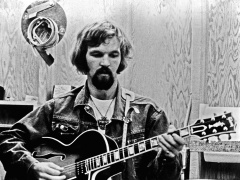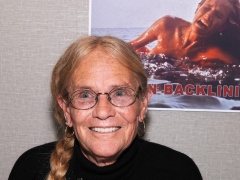
Shinji Aoyama, the Japanese film director, writer and composer known for the film “Eureka,” which won him two prizes at the 2000 Cannes Film Festival, died March 21 in Tokyo after a battle with esophageal cancer, according to local reports. He was 57.
Aoyama made waves in the international film community when he premiered “Eureka” at Cannes. The film was a black-and-white drama about the aftermath of a bus hijacking, based on a real incident, and it won the FIPRESCI and Ecumenical Jury prizes. “Eureka” boosted Aoyama to the forefront of a new generation of Japanese filmmakers, and he returned to the festival in 2001 with “Desert Moon” and in 2005 with “Eri Eri Rema Sabakutani.”
Born on July 13, 1964, in Kitakyushu, Japan, Aoyama initially wanted to be a rock musician, but became interested in cinema after watching Francis Ford Coppola’s 1979 film “Apocalypse Now” and later cited Jean-Luc Godard’s films “Pierrot le Fou” and “Two or Three Things I Know about Her” as key inspirations. He said the two filmmakers were “very close to my idea of rock and roll.”
In college, Aoyama was an assistant to the director Kiyoshi Kurosawa, whom he cited as another influence in his work. “I know that it’s the same for Kiyoshi Kurosawa as for me: we really like music. If you don’t have rhythm, then you can’t do it,” Aoyama said in a 2005 interview, explaining how he manages to pace his films.
Aoyama was drawn to making films about his hometown, and he made his feature film debut in 1996 with his film “Helpless.” The movie won prizes in Japan and launched the career of Asano Tadanobu, who played a violent ex-con. “Helpless,” along with “Eureka” and his 2007 film “Sad Vacation,” comprised his “Kitakyushu Saga.” His 2013 drama “The Backwater,” about a man’s relationship with his abusive father, won him best director honors at Locarno, as well as many domestic awards. Aoyamawas also invited to Venice for “Korogi” in 2006 and “Sad Vacation” in 2007.
His other credits include the films “Desert Moon,” “My God, My God, Why Hast Thou Forsaken Me,” “Living in the Sky,” “Tokyo Park,” among many others.
Aoyama was also novelist who wrote 11 books, some based on his films, as well as a film critic. He served as a member of the jury of the Tokyo Film Festival and was also a film professor at Tama Art University in Tokyo.
Always a student of the craft, Aoyama was known for his ability to stick by his artistic roots and not succumb to the temptations of commercial success. In one interview, he spoke to what he believed to be the definition of a “movie.”
“I guess a movie is life,” Aoyama said. “But, well, it’s really hard to define, but a movie is something more than life. It captures something that you can’t really put in words.”






